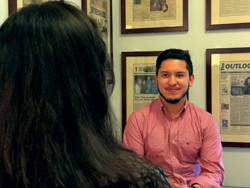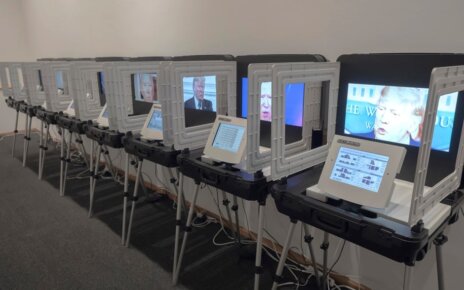At some point in our lives we have or will be going into an interview; more times than not, we are nervous, excited, and a little sweaty. To combat those unfortunate side effects of finding your perfect career or finding a side job to make some cash, there are some tips and tricks that can help you navigate your way through it.
Assistant Director of Career Services, Jeff Mass said, “The interview is essentially an ‘elimination process’ and the employer is trying to weed out those who are not the most worthy of the position.”
Having a resume is typically what gets you into the interview process. “Your resume was strong enough to get you to the interview – now it’s time to bring it to life. Turn your experiences into a compelling story that reflects who you are, what you have done, and how you have mad an impact,” Mass said.
Before even getting to the interview, it’s important to remember that preparing yourself and planning ahead are the two most essential tips you will need to remember.
Mass suggested, “If you are a college student, set up an appointment with your career center and have them conduct a mock interview with you. You don’t necessarily want to memorize responses, but try to have a general strategy for answering common interview questions.”
“To prepare for these, you’ll want to think about prior workplace or internship experiences that describe your endeavors or show how you dealt with a difficult situation,” he continued.
Being able to draw on previous situations you were able to navigate that another candidate may have not have had to face or did not bring up might be able to put you ahead of another potential hire.
Maggie Ripnick, a senior English and education student said, “When I first go into an interview, my first thoughts are: what are they going to ask me, who exactly is going to interview me, how long is it going to be?”
“In order to prepare for my interview I try to stay calm as best as I can. I also research the company or school that I am going to interview with so I am prepared and have some background knowledge on them. I also keep in mind that everyone at some point in their career goes through the same process of interviewing so it helps me realize I am not the only one and that makes me less nervous,” Ripnick continued.
Ema Svorinic, a senior business administration student said, “My first thoughts are to relax and be myself.”
“I research the company’s background, their major focuses and initiatives and think of ways that I can fit into that culture and team and what I can bring to the company so that I am prepared to bring that to the interview,” Svorinic continued.
The way you answer questions is abundantly important and one of the main pieces of an interview with any future employer whether it be for a summer job, an internship, or your potential career.
When nearing the end of an interview, a lot of people get stumped when the interviewer asks, “Are there any questions you have?” Mass suggests that you should be able to ask questions that prove you are willing and eager to learn more about the company.
His examples are: “What are your expectations for this role during the first 30 days, 60 days, a year? Describe the culture of the company, what are the next steps in the interview process?”
Of course, the way you are able to speak and communicate with your future employer is necessary, the way you present yourself is also a key factor in being hired.
“First impressions can go a long way, especially when it comes down to the way you appear in front of your future employer. Dress in a manner that is professionally appropriate to the position for which you are applying. In almost all cases, this means wearing a professional suit,” Mass said.
While doing all of these important things before and during your interview may help you with your employer, there is a little more to it than just the big things.
“An interview is about more than just giving answers to questions- it’s also about the impression that you make. Here are some of the ‘little things’ that matter: arrive on time, send a thank you email or note within 48 hours, know the dress code, pay attention to your body language, be friendly to everyone you meet.”
PHOTO TAKEN by Nicole Riddle




